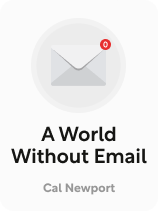

This article is an excerpt from the Shortform book guide to "A World Without Email" by Cal Newport. Shortform has the world's best summaries and analyses of books you should be reading.
Like this article? Sign up for a free trial here.
What are specialized workers? Why should businesses embrace specialization?
In A World Without Email, Cal Newport argues that employees are unhappy at work because they have too much on their plates. To fix this and increase productivity, he suggests practicing specialization at work.
Let’s look at what specialized workers do and why they’re important for employee happiness.
The Specialization Principle
Newport’s solution to optimizing the systems that extract value from knowledge work is to have workers focus on fewer tasks and do them with higher quality and accountability—in other words, to specialize. This means you don’t lose productivity by multitasking, and you don’t waste time answering unimportant questions.
(Shortform note: Other time management specialists agree with Newport that to produce the highest-quality work, you must specialize. In Eat That Frog, Brian Tracy even specifies that there are three tasks at work that let you add the most value, so you should figure out what those three tasks are, and move all other responsibilities off your plate.)
Newport advocates several ways for companies to turn their employees into specialized workers.
Pass Off Ancillary Work Someone Else Can Do Better
Let specialized workers hand off ancillary tasks—secondary tasks that support the primary operations of a company or worker—to someone who can do them more efficiently than you. For a business owner, these are things like marketing, customer service, travel booking, and so on, and for a knowledge worker, these are things like scheduling meetings, answering minor queries, and handling speaker requests. This may mean losing some revenue at first, but in the end, it will be more productive than knowledge workers doing everything themselves.
(Shortform note: But what if you can’t delegate work? First, approach the person who assigned the ancillary work in the first place and ask them how to prioritize this task among your existing tasks. This may prompt them to reassign it. If they don’t, still try to find parts of the task you can pass off, even if they’re small. Taking these steps might not even incur a loss of revenue—though they don’t necessarily solve the long-term problem of having too much on your plate.)
Adjust Your Role So Your Value Hinges on Your Knowledge Work
If possible, adjust your professional role so it depends more on your ability to perform knowledge work and less on your ability to be responsive and accomplish minor tasks, recommends Newport. This means there’s more pressure to perform that knowledge work well—because there’s no other way to add value to the organization—but it also frees you from the distracting HHMW. For instance, you might propose a new initiative to your boss and request that you be able to work on it to the exclusion of all else.
(Shortform note: Newport recommends adjusting your role within a company to be more knowledge work-specific, but going freelance might be a better way to attain a fully knowledge work-focused work life. As a freelancer, you get to choose the projects you work on and can therefore opt out of work you don’t enjoy. You’re also your own manager, meaning you can determine at what pace you respond to messages, thereby circumventing the hive mind workflow. And as Newport says, your job is contingent on your output: If you perform the work well, people will keep hiring you. If you don’t, you won’t get hired.)
Implement Sprints to Encourage Sole Focus on Knowledge Work
To promote specialized workers, implement a sprint workflow, advises Newport: Divide the work year into (usually two-week) periods during which a team works toward a single goal with no interruptions or other demands on their time. Communicate this workflow to people outside your team so they set proper expectations of when you can get back to them.
(Shortform note: Others even advocate using sprints in your personal life to execute important tasks. You can make your personal sprints much shorter—90 to 120 minutes—and schedule them at your most productive times of the day. Focus exclusively on one task during them, and take a break after. To stay optimally productive, consider telling family and friends about your personal sprints so they know not to bother you.)
Dedicate a Set Number of Hours Each Week to Tasks
To ensure you maintain enough time during the week for knowledge work, Newport says you should set a fixed number of hours each week for various tasks. These can be tasks like helping others, performing administrative duties, attending meetings, and the actual knowledge work you were hired to do.
(Shortform note: While setting a fixed number of hours per task each week can help fend off the HHMW, be aware that the amount of time you must allocate to each task may change over the course of the year. For instance, accountants have a busy season at the beginning of the year, during which they must dedicate most of their time to doing taxes. Pay attention to how your role changes annually and adjust your hours per task accordingly.)
Improve Workplace Support Staff Systems
Finally, if your workplace has support staff, optimize their systems, as well, to allow knowledge workers to work with minimal interruption, Newport advises.
(Shortform note: Rather than optimizing support staff systems, more companies are doing away with support staff altogether and replacing them with automated systems and AI.)
To do this, first set up workflows that govern how support staff work. This lets them work on one task at a time, thereby enhancing their productivity and happiness and making them greater assets to the company and its specialized workers. Second, structure their support work with the aim of impacting specialists’ work as minimally as possible. This might mean consolidating multiple emails into one or creating a system in which a specialist can submit a request and a support person physically comes by their office to ask follow-up questions.
(Shortform note: Newport acknowledges that these recommendations, which hinge on making life easier for knowledge workers, can lead to an ethos that holds up knowledge workers as geniuses and sees support staff merely as facilitators of that genius. Newport doesn’t deny that in today’s economy, knowledge work simply is the most valuable output and therefore must be prioritized. But it’s also possible that a positive company culture can mitigate support staff’s feelings of being less important. A strong company culture that makes everyone feel part of a team and mission increases employee engagement, no matter what their role is.)

———End of Preview———
Like what you just read? Read the rest of the world's best book summary and analysis of Cal Newport's "A World Without Email" at Shortform.
Here's what you'll find in our full A World Without Email summary:
- How email makes knowledge workers less productive and more unhappy
- How to improve the channels through which people communicate
- Why you should implement protocols to reduce unnecessary work






